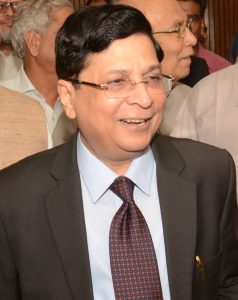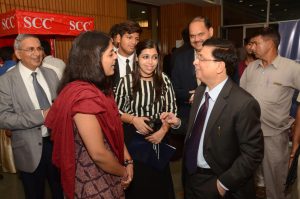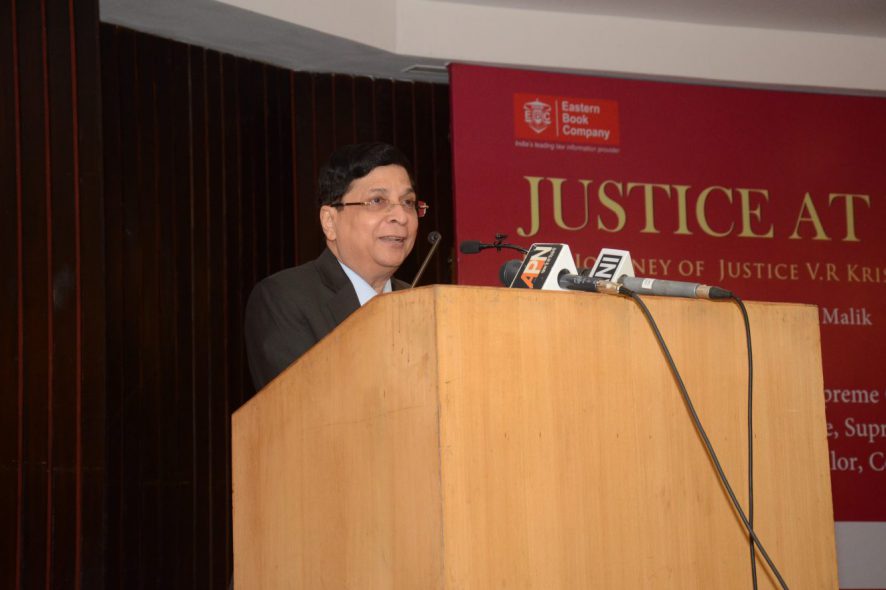 Ministry of Law and Justice has finally put rest to the speculation over the appointment of the next Chief Justice of India and has notified that Justice Dipak Misra will be the 45th Chief Justice of India after the incumbent Chief Justice, Justice JS Khehar, who is set to retire on August 28, 2017, had recommended Justice Misra’s name as his successor. Justice Misra, who was born on October 03, 1953, will serve as the Chief Justice of India till October 02, 2018.
Ministry of Law and Justice has finally put rest to the speculation over the appointment of the next Chief Justice of India and has notified that Justice Dipak Misra will be the 45th Chief Justice of India after the incumbent Chief Justice, Justice JS Khehar, who is set to retire on August 28, 2017, had recommended Justice Misra’s name as his successor. Justice Misra, who was born on October 03, 1953, will serve as the Chief Justice of India till October 02, 2018.
Justice Misra has been serving as a Supreme Court Judge since October 2011. He began his career as an Advocate in 1977 and practiced in Constitutional, Civil, Criminal, Revenue, Service and Sales Tax matters in the Orissa High Court and the Service Tribunal. In 1996, he was appointed as an Additional Judge of the Orissa High Court and was later transferred to the Madhya Pradesh High Court in 1997 and became a permanent Judge in December 1997. Justice Misra has also served as the Chief Justice of the Patna and Delhi High Courts before being elevated to the Supreme Court.
While we wait for Justice Misra to take oath on August 28, let’s take a look at some of his notable Supreme Court judgments:
- Nirbhaya Verdict[1]: The Nirbhaya case needs no introduction. The world waited for almost 5 years to know the fate of the men responsible for the heinous crime of gang rape and torture committed in a moving bus in Delhi on the night of December 16, 2012 which led to the death of a 23-year-old girl. As an aftermath, the whole world came together to demand justice for the girl and the prime accused committed suicide in his jail cell. Justice Misra headed the 3-judge bench that sent the 4 offenders to the gallows. In the 429-page long judgment, Justice Misra wrote that ghastly manner in which the offence was committed “sounded like a story from a different world where humanity has been treated with irreverence.”
- Yakub Memon Hanging[2]: Justice Misra headed the 3-judge bench that held that there was no procedural flaw in the curative petition decided by the Supreme Court and the issuance of the death warrant by the TADA Court, thereby, ensuring the hanging of the 1993 Bombay Bomb Blast convict. Considering the urgency of the matter, the bench conducted an unprecedented midnight hearing and Yakub Memon was executed on the following morning. After Yakub Memon’s execution on July 30, 2015, it was reported that Justice Misra had received death threat via a letter that said that he will not be spared.[3]
- National Anthem Case[4] : The 2-judge bench headed by Justice Misra made it mandatory for all cinema halls to play National Anthem, with the National Flag on the screen, before the film starts.
- Nitish Katara Verdict[5]: Sentencing Vikas and Vishal Yadav to 25 years imprisonment for brutally murdering Nitish Katara who was in love with their sister, Justice Misra used strong words to condemn ‘honour killing’ and said that “neither the family members nor the members of the collective have any right to assault the boy chosen by the girl. Her individual choice is her self-respect and creating dent in it is destroying her honour. And to impose so called brotherly or fatherly honor or class honor by eliminating her choice is a crime of extreme brutality.”
- Constitutionality of Criminal Defamation[6]: Justice Misra headed the bench that upheld the constitutionality of Criminal Defamation as an offence under Sections 499 and 500 IPC and held that an individual’s right to criticise is not absolute and right to free speech cannot mean right to defame others.
- Online availability of FIRs[7]: Justice Misra was also one of the judges who directed the Union of India and the States to upload the FIRs on the official websites of police within 24 hours of registration so that the accused can download it and file appropriate application before the court.
 Justice Misra, who, also serves as the Executive Chairman of the National Legal Service Authority, was the brain behind the idea of establishing Nyaya Sanyog i.e. Legal Assistance Establishments in all the State Legal Services Authorities in order to facilitate easier access to information with regard to the legal services.
Justice Misra, who, also serves as the Executive Chairman of the National Legal Service Authority, was the brain behind the idea of establishing Nyaya Sanyog i.e. Legal Assistance Establishments in all the State Legal Services Authorities in order to facilitate easier access to information with regard to the legal services.
Justice Misra is presently hearing some very important cases like the Whatsapp data privacy issue, Sahara matter, search engine regulation matter, etc. Justice Misra was also a part of the 7-judge bench that imposed 6 months imprisonment on Justice CS Karnan for being in contempt of court. He is also a part of the 3-judge bench that will be hearing the Ayodhya matter from August 11.
Trivia: Did you know that Justice Misra will be the second person from his family to serve as the Chief Justice of India? His uncle Justice Rangnath Misra was the 21st Chief Justice of India.
_____________________________________________________
[1] Mukesh v. State, (2017) 6 SCC 1
[2] Yakub Abdul Razak memon v. State of Maharshtra, (2015) SCC Online SC 661
[3]http://www.thehindu.com/news/national/supreme-court-judge-dipak-mishra-who-handled-yakub-memon-case-receives-threat-letter/article7511506.ece, last visited on 09.08.2017
[4] Shyam Narayan Chouksey v. Union of India, (2017) 1 SCC 421
[5] Vikas Yadav v. State of UP, (2016) 9 SCC 541
[6] Subramanian Swamy v. Union of India, (2016) 7 SCC 221
[7] Youth Bar Asso. Of India v. Union of India, (2016) 9 SCC 473







